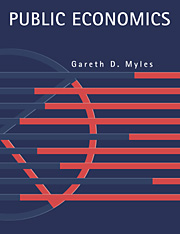Book contents
- Frontmatter
- Contents
- List of figures
- List of tables
- Preface
- Part I Foundations
- 1 Introduction
- 2 General equilibrium and welfare economics
- 3 Topics in measurement
- Part II Analysis in the competitive economy
- Part III Relaxing the assumptions
- Part IV Introducing real time
- References
- Author index
- Subject index
3 - Topics in measurement
Published online by Cambridge University Press: 05 June 2012
- Frontmatter
- Contents
- List of figures
- List of tables
- Preface
- Part I Foundations
- 1 Introduction
- 2 General equilibrium and welfare economics
- 3 Topics in measurement
- Part II Analysis in the competitive economy
- Part III Relaxing the assumptions
- Part IV Introducing real time
- References
- Author index
- Subject index
Summary
INTRODUCTION
The previous chapter has reviewed the theory and concepts involved in the measurement of welfare and the motivations for adopting these approaches. The welfare judgements that emerged from that analysis were based unavoidably upon utility concepts and this basis is found by many to be objectionable. In response to this, alternative means of assessing the economic outcome that rely, in the main, on observable and measurable quantities are now discussed. At first sight these appear to be rather more tangible concepts than those of utility and social welfare. Most of what is said below applies equally to a range of economic indices far broader than just those considered here.
The chapter begins with a discussion of the definition of income which is the basic observable and measurable quantity from which indices of inequality and poverty are formed. Although there is little doubt about the meaning of income in a world of certainty, it is rather less well specified when there is uncertainty about the values of future variables. The distinctions between the available definitions of income are clarified and their relative merits noted. Data on household incomes, though, cannot be used directly in the construction of economic indices since the households will differ in their size and composition and, consequently, in their requirements. This observation motivates the consideration of equivalence scales, which are a means of adjusting observed household incomes to take account of household composition effects and to provide a set of comparable income measures.
- Type
- Chapter
- Information
- Public Economics , pp. 59 - 96Publisher: Cambridge University PressPrint publication year: 1995



